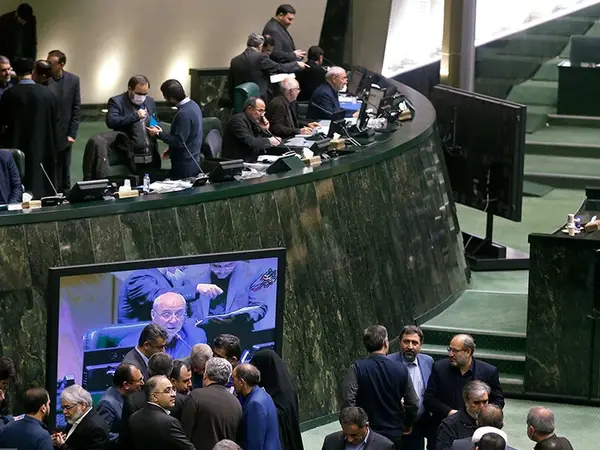The Islamic Republic’s parliament is mulling over a plan to ban regime’s officials from leaving the country to stop them from moving capital out of Iran without accountability.
Hardliner member of parliament Jalal Rashidi Kouchi said Saturday that banning the exit of senior officials, which is on the agenda of this parliament, is meant for the "protection of the assets and documents of the people and the country."
The plan is titled "Prohibition of the Islamic Republic of Iran's administrators from leaving the country after completing their duties" and will be discussed at the parliament next week, IRGC affiliated Tasnim news agency said.
It is not clear if the timing of this proposal is related to nationwide antigovernment protests and the resulting political instability.
Referring to Iranian fugitive banker Mahmoud Reza Khavari, who was involved in an embezzlement scandal and fled the country to Canada, Rashidi Kouchi said such a plan would guarantee that officials cannot leave Iran with the money they obtained from embezzlement and bribery.
Khavari was the chairman of Bank Melli Iran until September 2011 and chairman of Bank Sepah’s board of directors from December 2003 until March 2005. He was involved in a big embezzlement case worth approximately $950 million. Khavari, who became a Canadian citizen in 2005, is a fugitive wanted by the judicial authorities of the Islamic Republic.
A certain time frame has been proposed for the plan. Officials would not be able to leave Iran in their last year of their service at a certain post and three years following the end of their job. Officials at a certain senior level must also register their properties in an existing system with the Judiciary and must refrain from any sale or transfer of properties during the four-year timespan.
It is still not clear to what levels of seniority the law would apply, but most mid-to-high-level officials often have properties registered to family and friends.
Kouchi also said that according to the plan, the departure of former officials will be subject to the permission of regulatory and security entities, such as the judiciary, the Ministry of Intelligence, the Intelligence Organization of the IRGC and the intelligence division of the police. He added that the priority of implementing this plan is for officials who hold dual citizenships or have close relatives abroad.
The move to adopt such measures can be seen as a sign that some Islamic Republic officials may be trying to relocate from Iran with their families and seek residence in other countries, while the regime wants to erect barriers. The pace of emigration by Iranians, officials and ordinary people alike, has accelerated since the current wave of protests. Many Iranians inside the country and abroad believe that the days of the clerical regime are numbered as the global community and international bodies have also started expressing support for the uprising and a serious financial-economic crisis is threatening stability.
Official reports this week indicated that at least $10 billion capital has left the country in the past 9 months.
Late in October, unconfirmed reports suggested that Iranian officials were sending their family members and assets abroad amid antigovernment protests that show no sign of abating. According to a report on the website of UK’s Daily Express, top officials of the Islamic Republic are reportedly attempting to secure British passports for their families. Citing an unnamed Iranian source, the report also claimed that officials have been chartering up to "five flights a day" for their families, adding that some sections of “Tehran’s main airport” have been taken over as a fast-track area for their own family and friends to escape the country.
